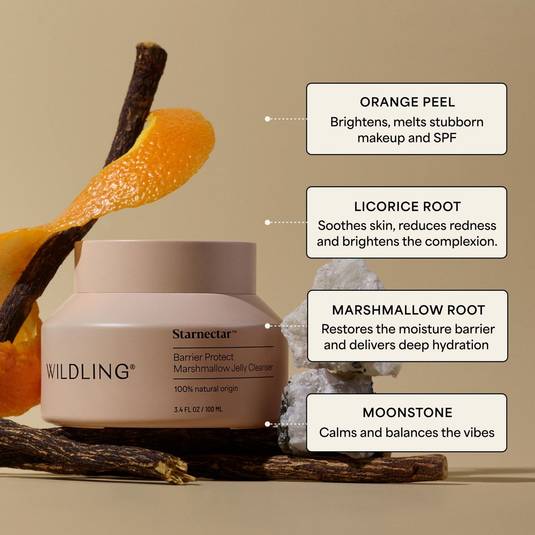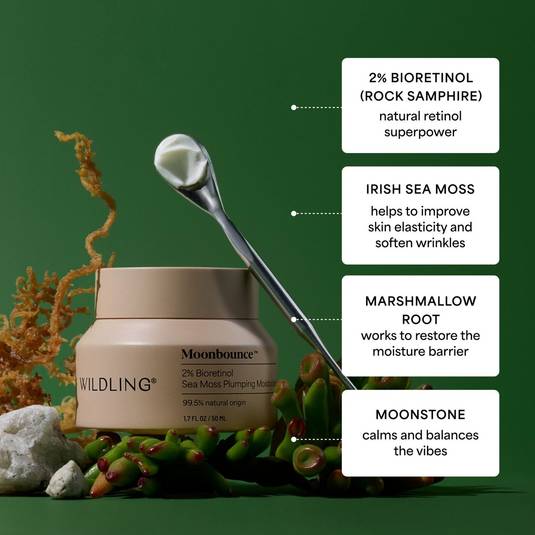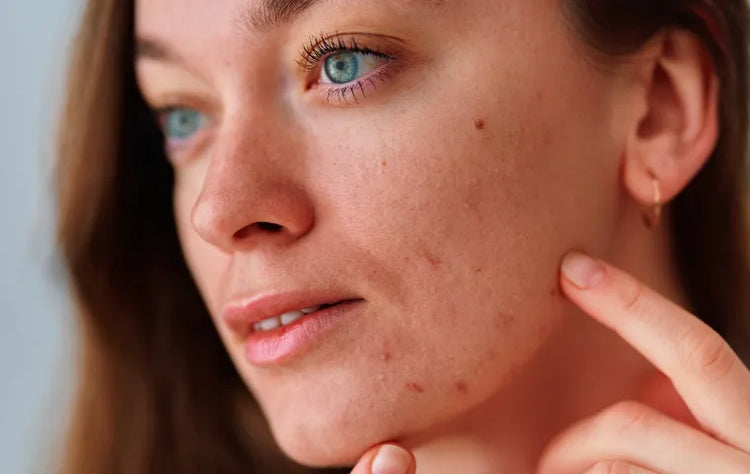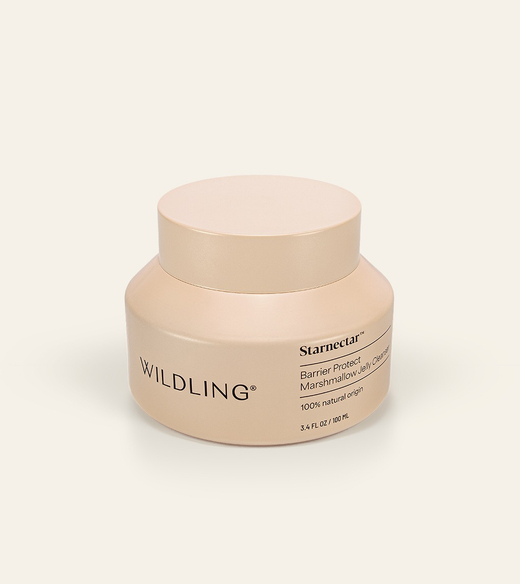Damaged skin barrier and acne — two terms that often go hand in hand but are often misunderstood.
Our skin's outermost layer, known as the epidermis, plays a vital role in maintaining hydration and protecting against external aggressors like sun exposure and free radicals. When this barrier is compromised, it can lead to a multitude of skin issues, including breakouts.
It may not be the first culprit that comes to mind when you have breakouts that don’t seem to go away — but unraveling the connection between a damaged skin barrier and breakouts can be a crucial step toward a healthier, more radiant complexion.
WHAT IS THE SKIN BARRIER?
The skin barrier, or moisture barrier, serves as the frontline defense against environmental irritants, allergens, and infections. It's composed of lipids, ceramides, cholesterol, and fatty acids, all of which work together to keep the skin's outermost layer, or epidermis, healthy and strong.
If you’re trying to picture your skin barrier, imagine it like a shield intended to keep bad things out and good things in.
A healthy skin barrier aids in preventing transepidermal water loss, dryness, and sensitive skin. When the barrier is compromised, it can exacerbate skin conditions and make the skin more susceptible to infections and irritation.
If your skin barrier function is out of balance, you might end up with dysfunctional, uncomfortably dry, or frustratingly oily skin.
WHAT CAUSES A DAMAGED SKIN BARRIER?
A damaged skin barrier doesn't happen overnight. Various factors can compromise skin health, and some of them are harder to avoid than others — but in many cases, the call is coming from inside the house. A damaged skin barrier could actually be stemming from your skincare routine.
If you exfoliate on a regular basis, turns out you might be overdoing it. Exfoliating can be beneficial for removing dead skin cells, supporting healthy cell turnover, and restoring a youthful-looking complexion… however, over-exfoliating can strip your skin's natural oils, leading to dryness and a damaged barrier.
Similarly, while cleansing your skin is an important part of your routine, cleansing too often, or using harsh soaps, can damage your skin barrier (and even lead to breakouts).
Environmental factors can also cause skin barrier damage and breakouts. Daily sun exposure without adequate sunscreen, for example, can weaken the skin barrier, contributing to premature aging and damage.
Allergens and free radicals can also play a part in damaging the skin's outermost layer. Antioxidants, like vitamin C, may support the skin in combatting these harmful invaders.
WHAT IS THE CONNECTION BETWEEN A DAMAGED SKIN BARRIER AND ACNE?
Contrary to what your high school health teacher may have told you, acne is not just a teenage concern; it affects many adults, too.
While acne as an adult may be related to hormonal changes in the same way that teen acne often is, it’s less common. Understanding the connection between a damaged skin barrier and breakouts is pivotal in supporting healthier-looking skin.
When the skin's barrier is damaged, it can lead to transepidermal water loss, creating a suitable environment for acne breakouts. The use of harsh acne treatments, like benzoyl peroxide, or over-exfoliating can further damage the skin, making the issue even worse.
So what’s a skincare aficionado to do? Let’s talk about how to form a well-rounded skincare ritual that paves the way for nourished, protected skin.
HOW TO BUILD A SKINCARE RITUAL FOR A DAMAGED BARRIER
Building a routine that focuses on skin barrier repair is essential for those dealing with breakouts and other skin concerns. First things first — in many cases, you’ll want to pare back your skincare routine, as skin barrier damage often results from “overdoing” some part of your routine.
Because of this, it’s often best to get back to basics. Here’s a go-to routine for rehabbing your skin.
1. Start With a Gentle Cleanser
The journey starts with cleansing, where using a gentle cleanser is paramount. Overwashing with aggressive soaps can strip the natural oils, so opting for non-foaming, pH-balanced cleansers can help maintain the moisture barrier without causing dryness.
Our Starnectar™ Barrier Protect Marshmallow Jelly Cleanser is the brightening, skin-softening, barrier-supporting cleanser you need to help gently support your skin barrier while clearing away potentially pore-clogging impurities. With a botanical blend of marshmallow root, licorice root, and orange peel, this cleanser gently melts away makeup and dirt without removing essential hydration from your skin.
Our cleanser is also infused with the vibration of calming Moonstone — so you can trust it to leave skin looking celestially refreshed, plump, and dewy. It’s perfect for restoring your natural moisture barrier and is suitable even for sensitive skin.
2. Go for Hydration
Hydration and moisturization are central to the regimen. Incorporating humectants like glycerin and hyaluronic acid helps retain moisture, and using moisturizers containing ceramides, cholesterol, and fatty acids can repair the skin's natural barrier. To give your moisture barrier everything it needs to restore itself, we’re going to break hydration into two steps.
Start with our Moonbounce™ 2% Bio Retinol Irish Sea Moss Plumping Moisturizer. This hydrating superhero uses a proprietary complex of bio-retinol and Irish sea moss to minimize the look of fine lines and wrinkles while supporting firm skin — without causing irritation.
It’s also boosted with marshmallow root and slippery elm bark to deliver deep hydration, all while soothing and plumping tired skin using natural ingredients. By leaning on a plant-based alternative to retinol, such as rock samphire, you can get the anti-aging effects you’re looking for without having to rely on potentially irritating ingredients like topicalretinol or retinoids.
3. Use Facial Oils
To seal in hydration and lend your skin barrier a helping hand when it’s not in its best shape so may be losing more water than usual, rely on a facial oil. Our Empress Balm of Gilead Barrier Repair Oil is like a Gua Sha massage in a bottle. It helps plump and tighten the look of your skin while supporting an even skin tone with antioxidant-rich botanicals.
Don’t worry about using facial oil if you have oily skin or are struggling with breakouts. If barrier damage is the culprit of your breakouts, an oil like our Barrier Repair Oil can act as an additional barrier for your skin because oils are occlusive. Occlusives help to lock hydration and other essential nutrients into your skin, ensuring that your skin barrier has everything it needs to recover.
Occlusive oils ensure that skin feels smooth, hydrated, and even while helping to minimize flare-ups of breakouts due to skin barrier damage. Finish your daytime routine with sunscreen, and you’re good to go.
ARE THERE SPECIAL SKINCARE CONSIDERATIONS FOR DIFFERENT SKIN TYPES?
Every skin type requires a unique approach to ensure skin barrier repair and overall health. Dry skin demands a focus on hydration and moisturization, with ingredients like hyaluronic acid playing a crucial role. Oily skin benefits from lightweight moisturizers, while sensitive skin requires more gentle care.
Blemish-prone individuals need to be particularly mindful of their choices, using non-comedogenic cleansers and being careful with active ingredients. If you’ve struggled with breakouts for a long time or are concerned there’s something more serious going on with your skin, it’s best to check in with a doctor or dermatologist to find more tailored solutions.
PUTTING IT ALL TOGETHER
Understanding the connection between a damaged skin barrier and breakouts requires a comprehensive and mindful approach to skincare.
By building a routine that caters to individual needs and includes cleansing, hydration, sun protection, and gentle care, it is possible to nourish your skin barrier and ease breakouts for brighter, happier skin.
Sources:
10 Skin Care Habits That Can Worsen Acne | American Academy of Dermatology
Understanding the connection between a damaged skin barrier and breakouts requires a comprehensive and mindful approach to skincare.






